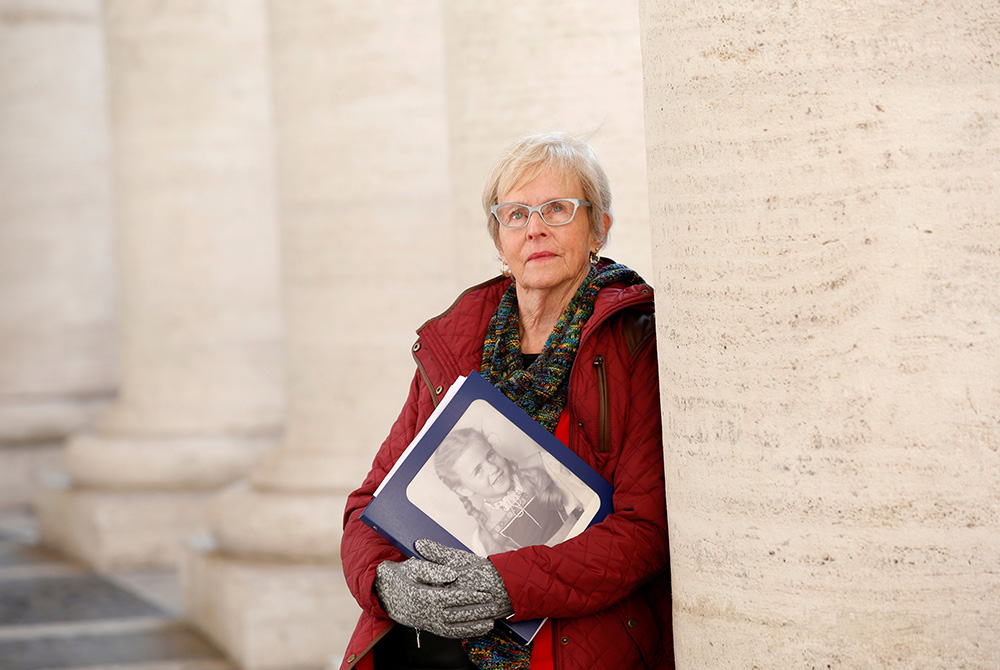
Mary Dispenza, national representative of Survivors Network of those Abused by Priests and head of its nun abuse group, poses in St. Peter's Square Feb. 20, 2019, at the Vatican. Dispenza joined SNAP because she says she was raped by a priest when she was 7. She took over the nun abuse group because a leader was needed and she was a former sister. (CNS/Reuters/Remo Casilli)
Editor's note: The overwhelming majority of people in religious life who have been accused of sexual abuse have been men. Credible accusations have also been made against women religious, but there has been relatively little coverage of those cases. As an independent, nonprofit source of news and information about Catholic sisters, Global Sisters Report devotes most of its resources to the good work sisters perform around the world. But we're committed to telling the full story of women religious, and that includes stories like this one. This is Part 2 of a two-part series. You can read Part 1 here. — Gail DeGeorge, GSR editor
After news of the clergy sexual abuse crisis in Boston broke open in 2002, the Leadership Conference of Women Religious knew it needed to get serious about helping its members appropriately handle abuse allegations in their congregations.
Working with abuse survivors, trauma professionals, canon lawyers, the Resource Center for Religious Institutes and the Center for Applied Research in the Apostolate, LCWR — an association of congregational leaders representing about 80% of women religious in the United States — put together legal resources and policy recommendations and dispersed them widely.
These resources are exclusive to the members-only section of the LCWR website, and LCWR was unable to make them available to Global Sisters Report. But LCWR's executive director, Sister of St. Joseph of Philadelphia Sr. Carol Zinn, explained congregations were advised to work with civil and church authorities to provide legal and emotional support to survivors and to take seriously any allegations — even if they were from six decades ago.
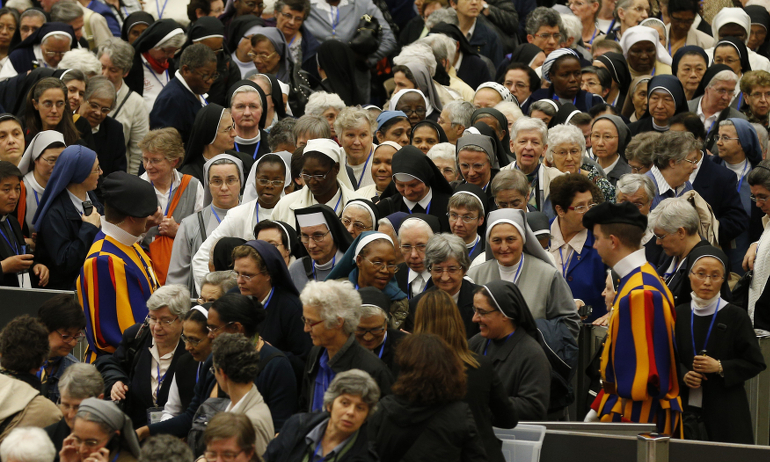
The heads of women's religious orders leave an audience with Pope Francis at the Vatican in 2016. (CNS/Paul Haring)
Several years after making the resources available, LCWR followed up with congregations to see what abuse policies and procedures had been put in place. Zinn said there was something close to 90% compliance. She emphasized, however, that LCWR has no legal or canonical responsibility for its members and can only offer them suggested guidelines.
"LCWR is a voluntary organization," Zinn said. "We have no authority over our members. We can't tell them to do anything."
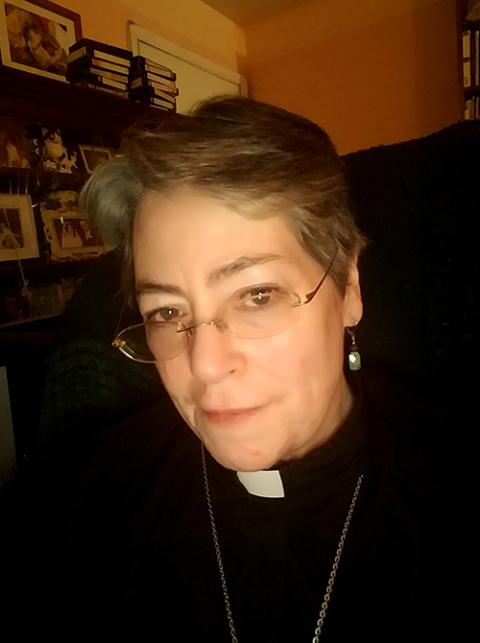
Cáit Finnegan, pictured in a current photo, says she was sexually abused by a Sister of Mercy over a four-year period as a teen. She currently serves as a bishop in the Celtic Christian Church. (Provided photo)
Cáit Finnegan, who says she was sexually abused by a Sister of Mercy over a four-year period as a teen, doesn't buy that.
"They keep saying through the years they have no authority to go into communities and say this or that. And that's a bunch of hogwash," she quipped. "They have moral authority like nobody else — these are the leaders of every damn religious order."
Since July 2004, the small arm of the Survivors Network of those Abused by Priests (SNAP) that advocates for people molested by women religious has been peppering LCWR with requests — primarily for the opportunity for survivors to speak at LCWR's annual assembly, but also for the conference to set up some form of a compulsory sexual abuse oversight program for member congregations.
LCWR, while expressing their commitment to work toward healing and raising their consciousness about sexual abuse, has repeatedly refused these requests over the last 17 years, usually citing the conference's inability to enforce any kind of oversight program and a desire for a more clearly defined process before survivors are invited to speak at the national assembly.
Zinn said LCWR's stance, from the beginning, has been that the conference leadership would be happy — delighted, even — to meet with anyone from SNAP.
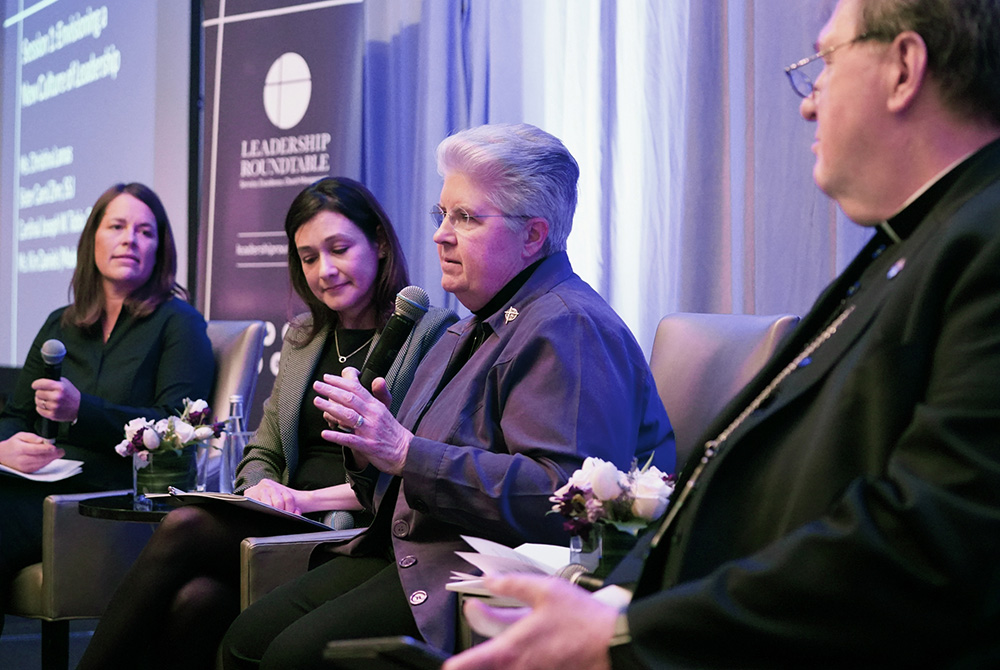
Sr Carol Zinn, a Sister of St. Joseph, executive director for the Leadership Conference of Women Religious, speaks during the Catholic Leadership Roundtable Feb. 28, 2020, in Washington. The event was organized to respond to the clergy sexual abuse crisis through a new culture of leadership in the church. From left: moderator Kim Daniels, associate director of Georgetown University's Initiative on Catholic Social Thought and Public Life; Christina Lamas, executive director of the National Federation for Catholic Youth Ministry; and Cardinal Joseph Tobin of Newark, New Jersey. (CNS/Ralph Alswang, Courtesy of Leadership Roundtable)
"But you are not going to stand in front of hundreds and hundreds of sisters without some kind of process and plan so that it can be helpful and have some kind of … result," she said. "My sense of what SNAP wants is to speak to everybody — and what we [the leadership] want is to speak first with SNAP to see if we can design something that will actually be helpful."
But SNAP has met with LCWR leadership to discuss its goals.
In October 2004, five representatives from SNAP met privately with members of the LCWR executive committee in Chicago, laying out their vision of justice and restitution. In a follow-up letter, LCWR thanked SNAP for "heightening our awareness of the long-term effects of sexual misconduct by women religious," but said they could not meet SNAP's specific requests in the manner they indicated.
Zinn was not part of LCWR at the time and could not comment on the Chicago meeting, but she said she engaged in a prolonged email exchange over several months in 2019 with Mary Dispenza, the former Religious of the Sacred Heart of Mary sister who has headed SNAP's "nun abuse" group for the last few years.
Zinn told GSR she asked Dispenza to outline what she would like to say to the LCWR assembly. Zinn, who said she thought LCWR and Dispenza were on the same page, then shared Dispenza's ideas with LCWR's presidents and attempted to schedule a meeting. But she said Dispenza did not want to meet.
Dispenza, for her part, does not recall declining a meeting with LCWR and said the claim left her "speechless and sad."
She also shared with GSR what she would say if ever given the opportunity to speak to the LCWR national assembly: She would encourage women religious to be truthful and open with survivors and to listen to them. Citing Matthew 5:23, she would encourage congregations to offer "fair and just" financial recompense. She would share the need to talk openly about sexual misconduct in religious life and would encourage LCWR to draft a statement specifically to survivors of nun abuse. She would also encourage LCWR to pen a statement in support of women still in religious life who were abused by other Catholic sisters, "including those who are deceased or have left their religious order."
Fundamentally, Zinn said there seems to be a misunderstanding between SNAP and LCWR on the point of process. "Until we could at least have somebody talk to us — the leadership, the people that plan the assembly — we are not just going to let somebody walk in and have time on the agenda," she said. "And that … seemed to be heard as, 'We do not want you in our room and we do not want you speaking to our members.' "
Dispenza said SNAP's primary goal as it relates to sexual abuse by women religious is to ensure that Catholic sisters are held accountable for their actions. It made her angry, she said, when women religious began publicly decrying clergy who had credible accusations of abuse against them without addressing the log in their own eye.
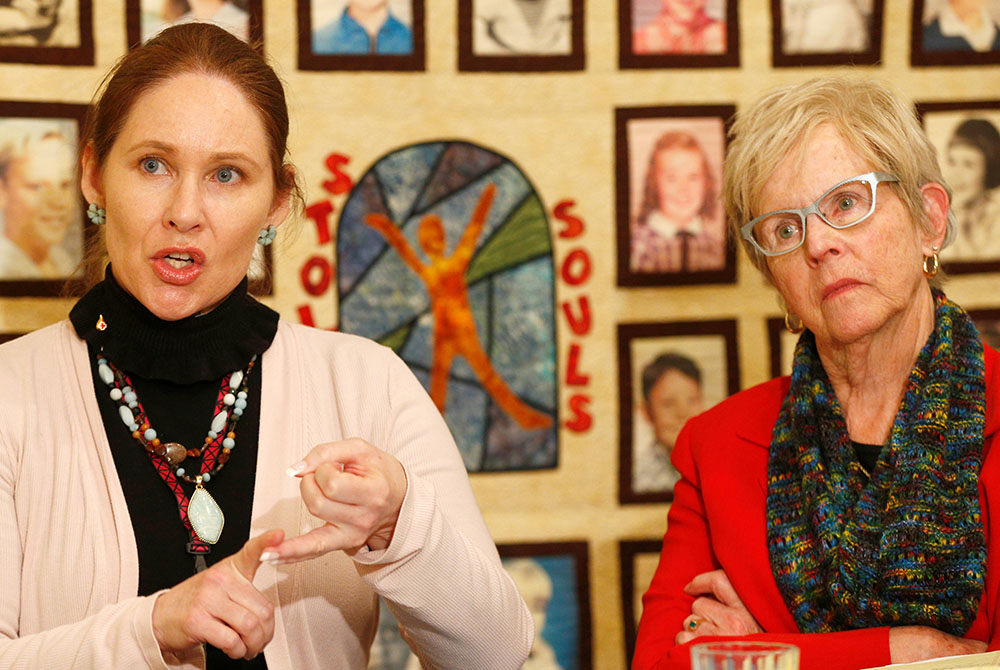
Carol Midboe and Mary Dispenza, members of the Survivors Network of those Abused by Priests, attend a news conference in Rome Feb. 24, 2019, the final day of the Vatican summit on the protection of minors in the church. (CNS/Yara Nardi, Reuters)
"They put out messages to the public and to all the sisters: 'Come forward, tell your story. Give it to us. We will help you.' For me, it was like, 'Well, wait a minute. You have never acknowledged abuse on the part of nuns of students and children. Where are you in that?' " she said.
To that end, SNAP has also reached out to the Council of Major Superiors of Women Religious, a smaller leadership group for women religious that also denied their requests. And Dispenza traveled to Rome in 2019 as part of a SNAP delegation to Pope Francis' sexual abuse summit. While nun abuse was not on the official agenda, Dispenza did media events and hosted side discussions about nun abuse at a nearby hotel. She also delivered a letter to the headquarters of the International Union of Superiors General, or UISG, similar to the ones SNAP has sent to LCWR.
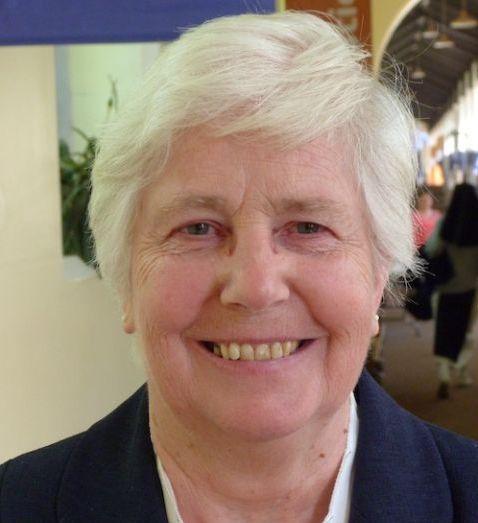
Sr. Patricia Murray of the Institute of the Blessed Virgin Mary is executive secretary of International Union of Superiors General. (Sarah Mac Donald)
In February 2020, Dispenza returned to Rome and had a meeting with the International Union of Superiors General Executive Secretary Patricia Murray, an Institute of the Blessed Virgin Mary sister. Dispenza has not heard from Murray since their meeting, with the exception of a short thank you email. "It's been rather frustrating," Dispenza said.
Despite her dogged attempts to confront women religious, Dispenza does not consider herself anti-sister. She joined SNAP because she says she was raped by a priest when she was 7 years old. She took over the nun abuse arm of the organization because a leader was needed and, as a former sister, it made sense that it would be her.
Dispenza's decision to leave religious life after 15 years was not one she took lightly; it took her seven years to leave after she initially sensed she was not in the right place. And she still travels more than 1,000 miles to visit one of her former sisters — her "dearest friend" — at least once a year.
And yet, Dispenza believes that religious life, with its emphasis on celibacy, is inherently unhealthy. It's not that all women religious are abusers, she said — it's that the confluence of repressed sexuality in religious life with the imbalance of power in Catholic institutions creates a perfect storm for would-be predators to act out. And, historically, congregations have not done a good job of excluding these potential predators from their ranks.
"I don't think healthy people misuse their power," Dispenza said. "But if you combine power with lack of health … there's going to be abuse of all kinds."
At least part of Dispenza's theory is backed up by research.
In the late 1990s, three research psychologists set out to survey women religious in the United States about their experiences of sexual trauma, given that childhood sexual abuse is a key indicator of whether someone will become a sexual abuser later in life.
What they found was that 40% of women religious had experienced sexual trauma in their lifetime, most of them as children. And for those who had experienced sexual trauma as vowed religious, their abusers were mostly either clergy or other women religious.
"This suggests a real need within religious communities for assessment, discussion, treatment, education/training, and policy development concerning sexuality and sexual trauma," the researchers concluded.
Some of that has happened in the last few decades.
Advertisement
Sister of Charity of St. Elizabeth Sr. Ellen Dauwer, executive director of the Religious Formation Conference, told GSR in an email that for years now, religious formation has done a better job of addressing human sexuality.
"Novices and other newer religious are asked to give thought to their own sexual identity," she said. "Healthy, intimate (non-genital) friendships are formed and encouraged and addressed. Men and women novices experience intercommunity novitiate together on a weekly basis and have a chance to practice these ways of forming healthy, celibate friendships."
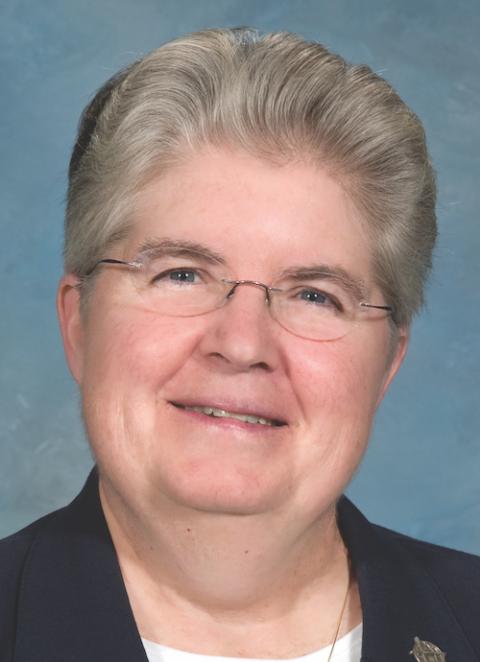
St. Joseph Sr. Carol Zinn, executive director of the Leadership Conference of Women Religious (Courtesy of LCWR)
Zinn said that's a very different formation than what she and others experienced decades ago. "It's much more about human development, and psychological development, and intimacy and relationships," she said.
Before the Second Vatican Council in the 1960s, when women joined the convent, they were essentially cut off from their former lives, she added. They were discouraged, if not forbidden, from attending events like their parents' funerals or siblings' weddings.
"There were no relationships, no intimacy," Zinn said — but emphasizing that the problem of sexual abuse among women religious cannot be boiled down to so simple a reason as just deficient formation.
It's complex and multilayered. It has to do with changes in culture and ministry (for example, women religious in the U.S. don't run large homes for orphans anymore, where abuse could go on practically undetected). It also has to do with individuals, which makes it hard to offer universal solutions. Individual abusers abuse for different reasons. Individual survivors have different paths toward healing.
Again, Zinn said, the LCWR leadership is happy to meet with anyone, but survivors ultimately need to bring their abuse allegations to the specific congregation. "My sense is, because it is all so local and particular, it has got to be addressed in person, in relationship," she said. "It cannot even be through the media."
Dispenza has seen some incremental change at the institutional level, though. She was pleased with Holy Cross Sr. Sharlet Wagner's presidential address at the 2019 LCWR national assembly, which recognized that women religious have been perpetrators of, as well as victims of, sexual abuse.
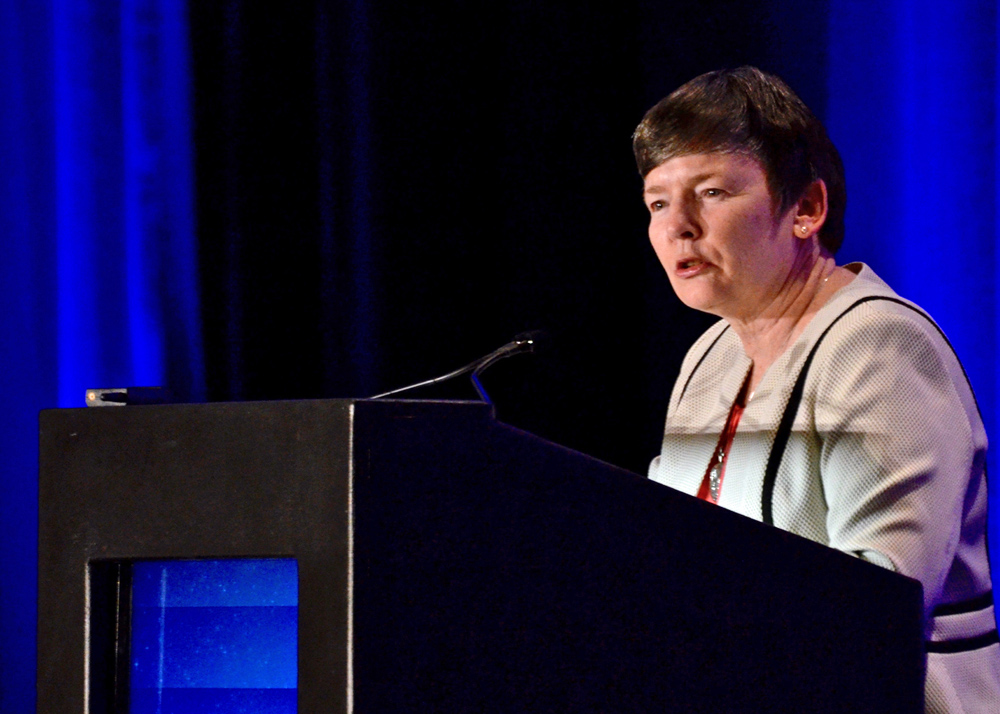
Holy Cross Sr. Sharlet Wagner, then president of the Leadership Conference of Women Religious, gives the presidential address Aug. 15, 2019, at the organization's annual assembly, in Scottsdale, Arizona. (GSR photo/Dan Stockman)
"It is a source of deep pain for us that in some instances, our own sisters have been perpetrators of the abuse. This is a truth we must not attempt to avoid," Wagner said in her speech.
"It may be a beginning," Dispenza said in an email to GSR shortly after the speech.
Women religious are also, slowly, being included in diocesan lists of those credibly accused of abuse. They almost never used to appear. And in 2019, UISG and the men's Union of Superiors General issued a four-page statement about sexual abuse that also acknowledged that women religious can be abusers.
"We bow our heads in shame at the realization that such abuse has taken place in our Congregations and Orders, and in our Church," they wrote. "We acknowledge that when we look at Provinces and Regions in our Orders and Congregations across the world, that the response of those in authority has not been what it should have been. They failed to see warnings or failed to take them seriously."
In the meantime, Dispenza and SNAP plan to continue pushing umbrella groups for women religious to recognize abuse survivors and to open up a pathway for healing — something many survivors say they have been denied by individual congregations.
"These actions need to be accounted for. Survivors need to have their day in the light and, in some cases, compensation, if that's what they need," she said. "It's a gross injustice."





